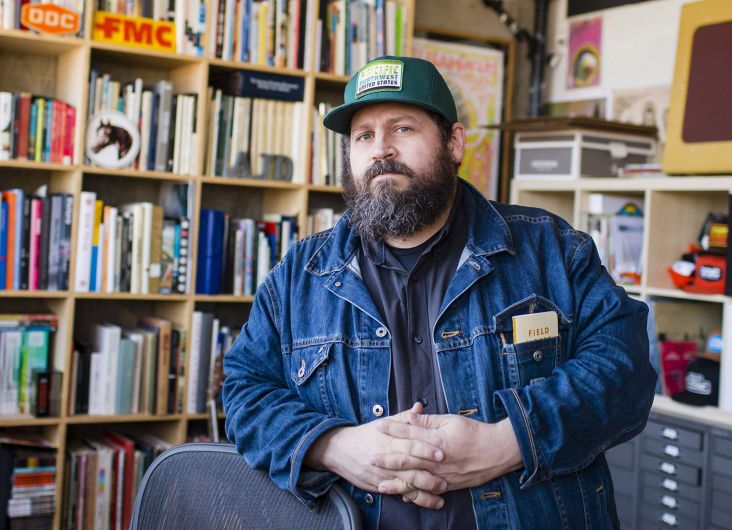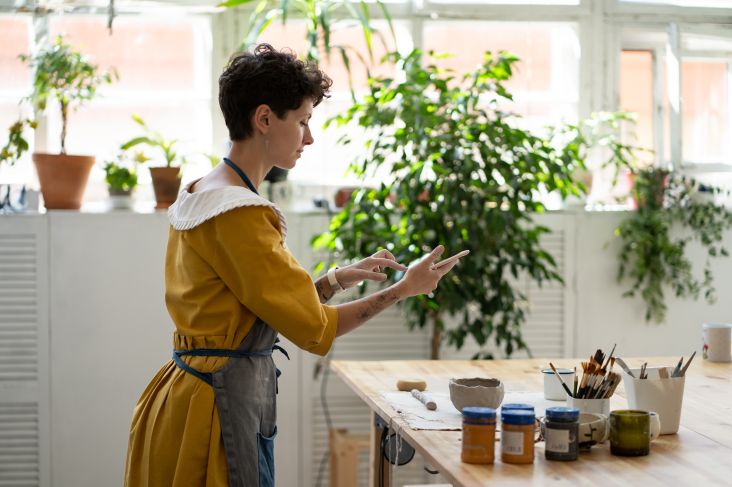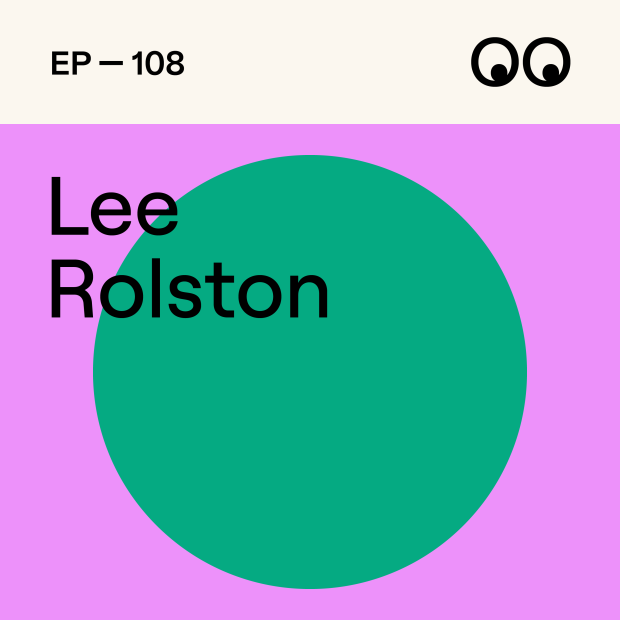Rookie mistakes freelancers make when they launch a business
It's easy for veteran business owners, like myself, to point out the wrongdoings of fresher faced freelancers on the creative scene.

Image licensed via Adobe Stock
I've been there, done that, worn the t-shirt, dragged myself through mud and back, washed the same t-shirt and eventually chucked it out only to replace it with a new one. Ok, enough with the t-shirt analogy.
It doesn't matter how young or old you are when you decide to venture out into the unknown; there are 'rookie' mistakes that you can avoid. With the wisdom of my Twitter friends, we'll attempt to run through some of the most common mishaps and offer some advice to help you 'new kids on the block' stay safe out there.
You forget that business is about people
When you work from home, it's easy to become a hermit and never leave your desk. But that's where you're going wrong. It's getting out and meeting people, becoming part of your local creative community, that's when the magic happens.
As Helen Fletcher, a freelance writer from North Wales, explains: "Don’t underestimate the power of networks; both within your freelance community for learning and moral support, and amongst your friends and family to find new clients. The world is smaller than you think."
The world is, indeed, small. With that in mind, "Treat everyone with kindness and respect, even if they don't afford you the same courtesy," says designer Luke Tonge. "Not only does it help your self-respect, but it's also strategic, you never know where the next job will come from or who you'll meet down the line. Your livelihood now relies on other people! Plus reputation goes a long way!"
You go a little Han Solo and feel all alone in the world
"Don't fool yourself into thinking that because you're a sole trader, you, therefore, have to do everything solo," says DoingItForTheKids. "By becoming a freelancer, you've just joined a huge community of other people who have been or are, where you are now. Don't be afraid to ask for help."
"Don't let yourself get lonely: email people you've never met, hook up with people on LinkedIn, ask contacts to introduce you to people," adds writer, Luc Benyon. "No one is irrelevant; everyone knows someone who is a potential client. Make friends and have coffee; it counts as work!"
"Speak up about what you're doing, with anyone, and build your network," says Cheryl Hill. "I don’t know what I would have done without the support I’ve had from people I’ve met."
Get out there, attend networking events, go to creative talks or workshops – spread your wings and allow yourself to brainstorm. Ask questions, open up. Make yourself a little vulnerable. You'll be surprised to find that there are many other freelancers in the same boat, more than happy to help or lend an ear.
"Have a strong support network around you," agrees Alastair Jones. "There will be days when you feel like giving up but being resilient and pushing through is so much more possible with encouragement and belief in you and people around you to use as a sounding board."
You devalue your worth
"Know your worth," says Sheffield graphic designer, Leanne Mallinder. "Research what is a fair hourly/day rate for your experience level and don't be bullied into working at a reduced rate, it will be hard to increase your rates for that client later on. Also, you don't want to be known as a cheap designer."
It's a topic Stina Jones agrees with: "Don’t be tempted to offer the cheapest rate possible to win a contract. You’ll only attract the kinds of clients who don’t value what you do."
"Don't work for free when promised exposure or possibility of more work; you rarely get it and your time and work is too valuable," adds Anna van der Feltz, a freelance designer based in Manchester.
Perhaps, though, it's about asking the right questions. "Instead of asking how to get paid more, ask how you can provide more value. So if you're a freelance writer, ask how you can improve your writing instead of how you can be paid a higher rate," adds Masooma Memon. That way, you'll be able to justify your worth.
"Your worth is correlated to how much more in value you deliver than you take in payment," adds Simon Alexander Ong. "If you can't clearly articulate what your value propositions, vision or beliefs are, the only way you'll be able to do so is by cutting prices. And that's not a game you want to play."
You ignore the warning signs of a potentially tricky client
With time and experience, it gets easier to spot the crazy clients during those initial meetings. You know, the ones you wish you'd never taken on. Here, we'll share a few red flags.
"Be wary of clients who want things fast and cheap," designer Alex Szabo-Haslam offers the biggest red flag. "Everyone has to eat but, ultimately, all that low-paid rush jobs lead to are more low-paid rush jobs — often for clients who don’t value your skills, and you’ll hate yourself for working on them."
Have you heard of the old – Good, Fast, Cheap? How you can choose two of the three but never all at once? It's a good one to keep in mind.
It's also about whether a client respects your time overall. "Don’t spend an entire day travelling to somebody’s office and back to have a meeting, unless you’re 100% sure the job is going ahead, and the meeting is necessary," says London illustrator, Emma Block. "If they want to chat, suggest a phone call or Skype session instead. Your time is important!"
You should also avoid being too naive, as illustrator Veronica Jamison warns: "Be wary of excessive flattery or clients who promise you the world. The former doesn’t matter if the job underpays or exploits your time. The latter is a tactic used to extract the most out of you. If they suggest you should be grateful for the work, run."
But clients aren't all bad. As designer Jake Yorath says: "If you find a good client, who listens to you, gives you a little freedom and pays on time, hold on to them like the last rations in a besieged castle. They are priceless!"
You forget to install a safety net with new clients
"Ensure you get at least 50% upfront in case things go wrong," says designer and illustrator, Paul Johnson.
"Always charge a 50% non-refundable deposit before starting any project. No excuses, no exceptions," adds Mirella Marie, from Melbourne-based studio, Vertigo.
But it's not just about ensuring you get paid. You need to protect yourself from anything that might go wrong. "Always get everything in writing," says Jane Gleeson, from Above the Fold in Dublin. "Include a caveat at the bottom of invoices to state that a fee can be incurred if payments exceed the deadline."
Another wise tip, courtesy of Stu Goulden: "Don't proceed without business insurance. A good policy will cover you for late/non-payment of invoices."
You don't save for tax
When you register as self-employed and set up as a sole trader, you're now responsible for paying your own tax. Your bill includes the tax you owe for the last tax year – this is called a ‘balancing payment’ on your bill. If this is more than £1,000, your bill will usually include an additional payment towards next year’s bill, known as a ‘payment on account'.
Oh yeah, 'payment on account' – that evil thing that no new freelancer is warned about. The Government explains more about understanding your Self Assessment, but the point is – save a seriously decent chunk of money to put towards your tax bill, which is due each January. Right after Christmas. Perfect.
"Don't spend the tax," says Marc Diamond of Wee Gem Design. "Did I mention not to spend the tax? Really. Don't!"
"Not all of that money going into your account is yours," adds freelancer Steve Folland, founder of podcast Being Freelance. "But tax folk don’t bite for ages so get online accounting software and separate personal/business accounts. So when they finally do you can smugly celebrate with cake instead of hiding and crying."
You underestimate and undercharge for new projects
"You will always underestimate how long a project will take," says illustrator Matt Richards. "Doubling your guess might be close. Your fees need to cover your holiday, sickness, equipment, admin and more. Where you can, don't use a 'day rate', as swapping time for money makes it hard to make a profit. Aim for value-based-charging, instead."
Another way to avoid undercharging upfront is by adding a disclaimer, preparing for added work in future. As New York designer, Milan Moffatt points out: "Avoid scope creep. Never hesitate to tell your client a change request will add time or is different than what you originally agreed upon. In your contract, provide an additional hourly rate for change requests that are out of scope."
Don't, whatever you do, over-promise and under-deliver. "It is essential not to talk a big game to secure the job and have your client’s expectations soar through the roof," explains Jason Paul Byrne. "Just be honest about the challenges, with the promise of hard work and know-how."
You go AWOL on clients
"Don’t disappear on a paying client," says Brooklyn designer, Mark Forscher. "It’s always better to over-communicate, especially when you realise you need more time to hit a milestone. Clients appreciate consistent updates and will likely be more forgiving if you are honest with them."
Clients want to know what's going on. Keep them in the loop; don't put your head in the sand. "When things get tough with a client, pick up the phone. We all love hiding behind email – this is no way to build a relationship," adds freelance copywriter, Jonathan Wilcock.
"Don't forget to communicate," remarks Petra Smith of Squirrels & Bears. "Keep your clients regularly updated and always be on a lookout for new work by keeping in touch with potential ones. Whichever channels you choose, keep the conversations going."
You don't make time to market yourself
First of all, tap up your existing network for opportunities: "Don't quietly slip into freelance life, let everyone know," says Oliver Shilling. "I have a few clients who got in touch off the back of my first post announcing I was going freelance, and more have come through friends of friends."
"Don't be afraid to pitch and don't think that work will just come to you," agrees Dana Nicole. "I feel a lot of freelancers are scared they aren't capable of doing the work (when they are), so they avoid going out and pitching themselves."
Dana's right. We may feel reluctant to get out there and sell ourselves because it feels quite unnatural. Something we've never had to do before. "If you want to avoid the feast and famine cycle, never stop marketing, even when your calendar is full," continues Hollie Sherrington.
Still not convinced? Natalie Lawrence believes it's character-building: "I’ve found freelancing has made me challenge myself and do things I’ve found uncomfortable and avoided, like promoting myself. I don’t feel nervous or self-conscious about it at all now. Freelancing can boost confidence."
You take on projects you probably shouldn't or spread yourself too thinly
It's always tempting to say yes to massive, lucrative projects that we know we're probably too small to handle, but our advice is to consider the bigger picture. How will it reflect on you if, weeks or months from now, you've not been able to deliver?
"Remember that clients are paying you to do a good job, so always do your best for them. If you can’t do that, don’t take the job on," warns Steve Perry, a freelance designer and developer.
"Know when to say no," says photographer Imogen Forte. "It's tempting to say yes to everything at first but not every offer is an opportunity and activity doesn't necessarily equal achievement. Be selective about the things you spend your time and energy on and the good work should follow."
"Try and focus your offer on what you’re good at and want to be doing, as opposed to everything you 'can' do," offers James Fox, a designer from Manchester. "As that’s ultimately going to bring in the work that makes you happy and that you can show where you add value."
You don't look after yourself or allow work to take over
Rest plays a vital part as a freelancer. You can't allow 'The Fear' to stop you from downing tools and taking time off.
"The graft is real but don't burn yourself out," says motion director and designer, Dan Silverstone "Your mental health comes first. Pace yourself, and you'll eventually find your own rhythm that benefits you and those of real importance around you."
It's not just about mental health, either. Invest in a decent ergonomic chair and check the way you sit at your desk. This helpful guide gives you lots of brilliant tips on maintaining a good posture.
"Posture is paramount! I haven’t been able to work for the best part of two months because of inflamed nerves/migraines which I’m pretty sure is down to craning my neck over my workspace. If only I could go back in time to correct the issue," says Clay Disarray, who does clay art and illustration.
"Remember your work-life balance," adds Dan Castro. "Figure out what you need or want to earn each month. Life is too short to spend every single minute working. Go and have an adventure. Your work will only be better for it!"
"Separate your work and personal energy, both in dedicated time and physical spaces," says Paul Schreiber. "Seems simple, but keeping your computer/visual reminders where you eat and sleep makes it difficult to rest. Also, rest."
For more freelancing tips, visit the original thread I started on Twitter. You'll find some pearls of wisdom from people who've been there and suffered from these rookie mistakes. But remember, sometimes, we have to go through these things ourselves before we learn the lessons.





















, commissioned by Creative Boom for International Women's Day 2019](https://www.creativeboom.com/upload/articles/fb/fbbe41e8d9d22eac120a99c4ab8acc144038258e_732.jpg)
